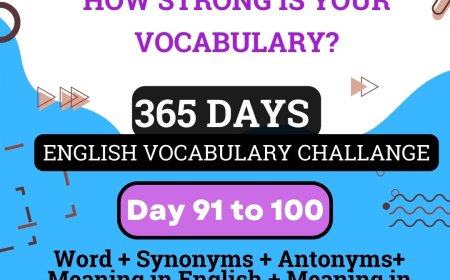8 Strategies for Effective Online Assignment Writing
Discover 8 effective strategies to improve your online assignment writing skills and make studying more manageable and productive.

Lets be realwriting assignments for online courses can sometimes feel like a solo battle. No classroom vibes, no direct face time with professors, and often, way too many tabs open at once. If youve found yourself juggling deadlines, unclear instructions, and a lot of Ill do it tomorrow momentsyoure definitely not alone.
The good news? Online assignment writing doesnt have to be a stressful guessing game. Whether you're working on a research paper, a technical write-up, or a design project, having the right strategies can make the process smootherand actually more rewarding.
In this blog, were diving into eight practical strategies that will help you write more effectively, stay organised, and hit those higher gradeseven when learning from behind a screen.
1. Understand the Assignment Brief Like a Pro
Before you even think about opening a blank document, make sure you truly understand whats being asked. Youd be surprised how many students lose marks simply because they misread or overlooked part of the brief.
Heres a quick checklist:
-
Have you identified the type of assignment (e.g. analytical essay, case study, report)?
-
Do you know the word count and due date?
-
Whats the preferred formatting style (APA, MLA, Harvard)?
-
Are there specific questions or prompts you must answer?
-
What weight does the assignment carry toward your final grade?
If any part of the instructions feels vague or confusing, dont hesitate to ask your lecturer or post in your course forum. Clarifying now saves rewrites later.
2. Create a Research-First Game Plan
Youve probably heard do your research a hundred timesbut the real trick is knowing how to do it well for an online assignment.
Start with your course reading list or digital library. These are usually full of peer-reviewed sources your instructor trusts. Use keywords from your assignment prompt to guide your search and be selectivequality over quantity always wins.
Make it a habit to organise your sources from the get-go. Use tools like:
-
Zotero or Mendeley for citation management
-
Notion or OneNote to clip useful sections or annotate PDFs
-
Google Docs with folders and tags for clean storage
Organised research leads to clearer writingand you wont be scrambling to find that one perfect quote at the last minute.
3. Draft a Clear Structure Before You Start Writing
Planning your assignments structure isnt just a good ideaits essential. A well-structured paper is easier to write, easier to read, and (frankly) easier to grade.
Try the simple PEEL method for paragraphs:
-
Point state your main idea
-
Evidence support it with data or sources
-
Explanation show how the evidence backs your point
-
Link connect it to your overall argument
Whether youre writing a 500-word summary or a 3000-word analysis, having a logical flow saves time and strengthens your message.
4. Use Your VoiceEven in Academic Writing
Academic writing doesnt mean robotic writing. Youre still allowed to sound like youjust a slightly more formal version of you.
Heres the trick: balance authority with clarity. Instead of saying,
It is evident from various scholarly works that
Try:
Several recent studies suggest that
Keep your sentences active and straightforward. Avoid unnecessary jargon unless its standard in your field (like technical terms in engineering or architecture). Your goal is to show understandingnot to confuse your reader.
5. Set Realistic Writing Blocks (and Actually Stick to Them)
Writing assignments online often means writing at home. And lets be honestthat means distractions galore.
Rather than trying to force a 4-hour writing marathon, break your work into manageable chunks. The Pomodoro Technique works wonders:
-
Write for 25 minutes
-
Take a 5-minute break
-
Repeat 4 times, then take a longer break
Apps like Forest, Focus Keeper, or Notions built-in timers can help you stay focused. And dont forget to switch your phone to Do Not Disturb mode. Instagram will still be there when youre done.
6. Use Online Tools, But Dont Rely on Them Blindly
Spell-check and grammar tools are your friendsbut theyre not always right. Tools like Grammarly, Hemingway Editor, or ProWritingAid are great for catching surface-level issues, but they cant replace real human judgment.
Use them to polish, not to write.
For more technical assignments (like architecture, design, or 3D modeling), make sure you also take advantage of discipline-specific support. For example, students working on Revit design submissions often seek Autodesk Revit assignment help to ensure precision and proper file formatting.
Whether its grammar or graphics, smart tools are there to enhance your skillsnot do your thinking for you.
7. Always Leave Time for Editing and Referencing
Ever submitted something and thought, Wait did I cite that properly? or I shouldve re-read that paragraph? Thats exactly why editing matters.
Heres how to make editing easier:
-
Step away from your draft for at least a few hours (ideally a day)
-
Read it out loudthis highlights awkward phrasing
-
Use a checklist: grammar, spelling, formatting, flow, citations
And speaking of citations, double-check that your referencing matches your required style. Use generators like CiteThisForMe or MyBibbut always verify the output. Automated tools often miss details, especially with obscure sources.
8. Know When to Ask for Help (and Where to Find It)
Theres no prize for suffering in silence. If youre stuck, confused, or overwhelmed, reach out early. Most online programs have virtual writing centers, discussion boards, or even peer mentoring systems.
And if you need more personalised support, theres no shame in seeking professional servicesjust make sure theyre ethical and legit. For students balancing work or other commitments, getting structured feedback through online tutoring or subject-specific help can make a huge difference.
Remember, the goal isnt just to finishits to learn, grow, and succeed.
Conclusion: Smart Writing Is Strategic Writing
Online assignment writing isnt just about typing faster or using fancy wordsits about working smarter, not harder. By understanding your brief, planning your structure, managing your time, and editing with care, youll not only improve your grades but also reduce stress along the way.
And most importantlydont let perfectionism paralyse you. Start small, write consistently, and trust the process. Online learning comes with its own challenges, but with the right approach, youve got everything it takes to thrive.
About the Author
Elsa Smith is a digital education strategist, academic writing coach, and passionate supporter of student success in the online learning space. With over 12 years of experience in higher education and e-learning platforms, Elsa helps students build practical writing skills that translate into academic and professional success. When she's not writing or mentoring, she enjoys weekend hikes and experimenting with herbal coffee recipes.



























